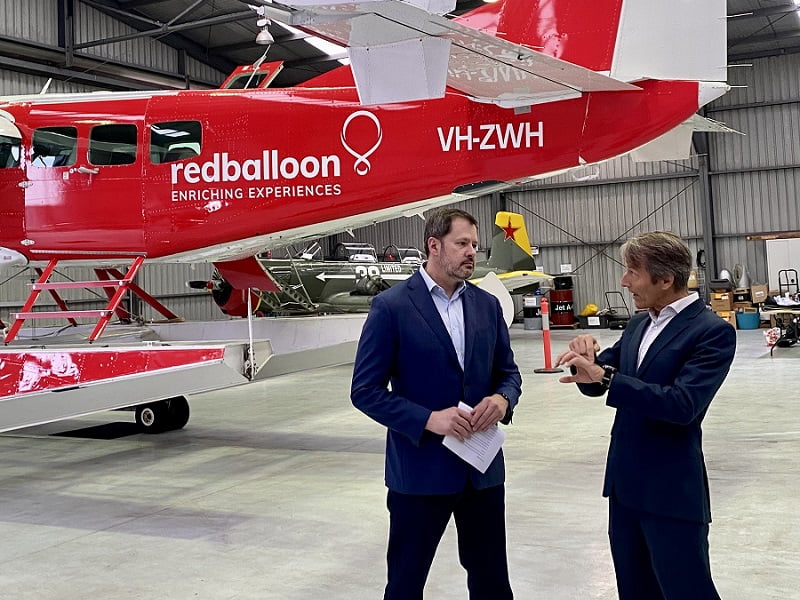A project to convert turboprop-powered aircraft to electric propulsion is one of 19 projects to share in $44 million worth of grants through the latest round of the federal government’s cooperative research centre projects program.
Australian aviation startup Dovetail Electric Aviation received the maximum funding allocation of $3 million under round 13 of the CRC-P program, announced by Industry and Science minister Ed Husic on Thursday.
Other successful recipients of the full $3 million research grant include biotechnology companies Ferronova, Sementis and Vaxxas, and Austech Telecommunications, which plans to upcycle waste from oil and gas subsea facilities.

A joint venture between the owner of Sydney Seaplanes, Sydney Aviation Holding, and Dante Aeronautical, Dovetail is developing technology to convert turbine-powered aircraft to electric propulsion for net-zero aviation.
It will use its $3 million research grant to support “develop, test and certify the conversion of turbine-power planes into fully electric powered aircraft”, initially focusing on short-haul flights to regional areas.
The company, which was formed in 2021, will work with the University of New South Wales and CSIRO, as well as Sydney Seaplanes and Memko, on the $12.8 million project. Last year, it also partnered with regional airline Rex and Dante Aeronautical.
Announcing the successful grant recipients from the Sydney Seaplanes hanger at Bankstown Airport, Mr Husic said all 19 projects “were finding ways to use Australian knowhow in very powerful, meaningful ways”.
He said Dovetail targeting rural and regional areas for the use of electric planes was “huge”, opening up the chance for cities and towns to have a “quick and easy way to travel around” without needing to connect through a major centre.
“We need to electrify as much as we can. Reducing emissions and, in some cases, reducing the high costs that are being experienced through energy prices, by being able to find alternate ways to power and meet the needs of business and households,” Mr Husic added.
Dovetail co-founder and managing director David Doral said the support from the CRC-P program would be “instrumental in taking this aircraft to market in the next decade”
“Air transport is going to be under significant scrutiny in the near future. But at the same time, it represents a significant opportunity because of all the technology industry capability development,” he said.
A total of 19 projects involving 57 Australian companies, including 41 small and medium-sized businesses received funding as part of round 13 of the CRC-P grants program. The other successful recipients include:
- Apollo Medical Imaging Technology: $2.97 million to develop AI-powered clinical decision support systems for faster and better diagnosis and treatment selection for acute stroke. The total project is valued at $7.54 million.
- Austech Telecommunications: $3 million to develop a new plant that can be used to upcycle marine waste from oil and gas subsea facilities that have been decommissioned. The total project is valued at $7.67 million.
- Ferronova: $3 million to develop super-paramagnetic iron-oxide nanoparticles for image guided cancer surgery and therapy. The total value of the project is valued at $8.03 million.
- Graphenex: $2 million to design, construct and operate a plot plant to demonstrate a transformative CO2 recycling technology in industrial conditions. The total project value is $7.57 million.
- AI: $2.65 million to further develop fall detection technology to identity indicators that occur prior to a fall, allowing carers to take preventative actions. The total project value is $9.35 million
- Novatti Group: $2.31 million to develop a digital platform consisting of novel anti-fraud and anti-money laundering techniques to align cryptocurrency transactions with traditional payment options. The total project value is $6.08 million.
- Samsara Recycling: $2.56 million to further develop technology that makes material “infinitely recyclable” using a plastic-eating enzyme. The total project value is $7.76 million.
- Sebstainable: 3 million to develop a novel industrial process to convert plastic waste into high-valued material (styrene monomer) and activated carbon using a portable energy-efficient catalytic pyrolysis reactor. The total project value is $6.65 million.
- Sementis: $3 million to further develop the “most advanced” viral vaccine platform in Australia. The total project value is $9 million.
- Vaxxas: $3 million to develop a novel COVID-19 spike protein vaccine using a “needle-free skin patch”. The total project value is $9.82 million.
- VivaZome Therapeutics: $3 million to establish an exosome manufacturing facility in Australia and optimise technologies and processes for manufacture of exosomes. The total project value is $7.7 million
Do you know more? Contact James Riley via Email.

